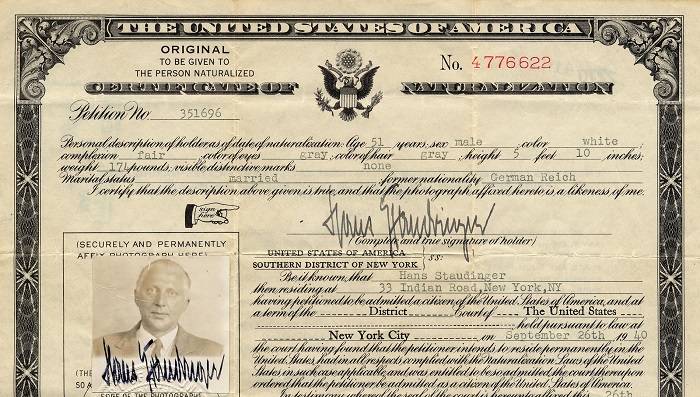Collections : [German and Jewish Intellectual Émigré Collections]
German and Jewish Intellectual Émigré Collections
Personal and professional papers of German-speaking Émigré in the social sciences, humanities, and the arts and the organizations which assisted those who fled the Nazi regime.
In recognition of the serious scholarly interest in the mass migration of German speaking exiles from the Nazi regime, a German and Jewish Intellectual Émigré Collection was established in 1976 at the University at Albany, State University of New York. This growing collection has been developed since the 1970s through the efforts of the University Libraries and Professor John M. Spalek of the University's Germanic and Slavic Languages and Literature Department
Search Constraints
Start Over You searched for: Collecting Area German and Jewish Intellectual Émigré Collections Remove constraint Collecting Area: German and Jewish Intellectual Émigré Collections Date range 1956 Remove constraint Date range: <span class="single" data-blrl-single="1956">1956</span>
« Previous |
1 - 10 of 16,343 entries
|
Next »
Search Results
Box 1 (emil lederer papers), Folder 1
Adele Gerhard Papers, 1938-1956 0.33 cubic ft.
The Adele Gerhard (1938-1965) Papers include hand-corrected typescripts, photocopies and clippings of essays, a collection of clippings about Cologne-born novelist Gerhard and reviews.
Adolph Lowe Papers, 1915-1996 5 cubic ft.
Biographical material includes biographies; personal papers from teaching at the University of Kiel, 1926–31 and University of Manchester, 1933–40; papers from Lowe's 80th birthday (1973); Veblen–Commons Award, 1979; interview with Die Zeit, 1988; correspondence, 1928–91; writings by Lowe, including lectures, speeches, published and unpublished works. Lowe was one of the founders of the New School for Social Research comprised mostly of the German intellectual Émigrés to the USA prior to WWII.
Records from legal battles and restitution claims of Albert (Leser) Lestoque and his two siblings, for family properties in the Plittersdorf section of Bonn, Germany. Also contains manuscripts and published versions of Lestoque's writings, including the manuscripts from lecture engagements, and materials from organizations as Citizens for Victory, the International Committee for the Study of European Questions and the German American Writers' Association (GAWA).
Alexander Gode Von Aesch Papers, 1924-1987 6 cubic ft.
Includes biographical information, photographs, correspondence, writings, and periodicals related to Alexander Gode von Aesch.
Alfred and Eva M. Neumeyer Papers, 1932-1973 1.17 cubic ft.
The collection contains copies of manuscripts of poetry, plays, and essays by Alfred Neumeyer as well as teaching notebooks of both Alfred and Eva Neumeyer.
Alfred C. Oppler Papers, 1908-1982 2.75 cubic ft.
The collection includes a diary, 1950; correspondence, 1942–1981; and manuscripts of books (including "Prussian Bureaucracy and National Socialism"), lectures, and reports, 1947–1959. As a civilian employee of the U.S. Army from 1946 to 1952, Oppler was the principal architect of legal and judicial reforms in occupied Japan.
Alfred Werner Papers, 1903-1979 23 cubic ft.
The Alfred Werner Papers contain typescripts of his writings on artists and art topics, as well as a small amount of correspondence, student papers, notes and research materials used for his writing. Werner's main focus was on Jewish art and artists.
